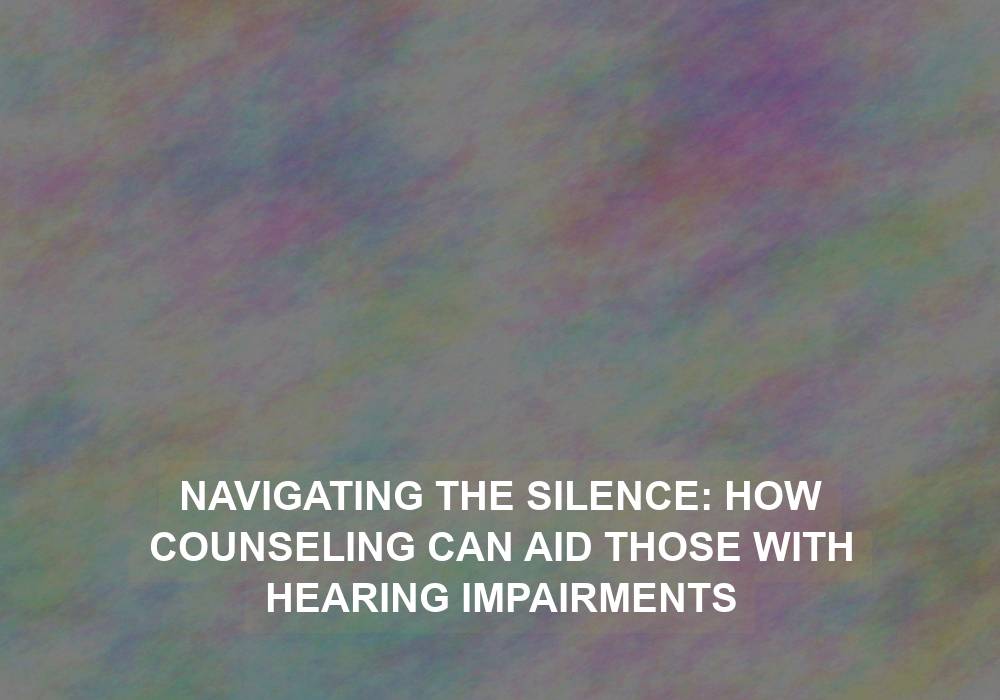Living with hearing impairments can present unique challenges and barriers to effective communication. The constant struggle to understand and be understood can lead to feelings of isolation, frustration, and even depression. However, with the help of counseling, individuals with hearing impairments can learn valuable coping strategies, improve their communication skills, and enhance their overall quality of life.
Understanding Hearing Impairments
Before delving into the benefits of counseling, it is essential to grasp the nuances of hearing impairments. Hearing loss can range from mild to profound, and it can be caused by various factors such as genetics, aging, noise exposure, infections, and certain medical conditions. Some individuals are born with hearing impairments, while others acquire them later in life.
Hearing impairments can have a significant impact on an individual’s ability to communicate effectively, leading to difficulties in social interactions, educational pursuits, and professional settings. This can result in feelings of frustration, embarrassment, and isolation, ultimately affecting one’s mental and emotional well-being.
1. Emotional Support and Coping Strategies
Counseling plays a vital role in supporting individuals with hearing impairments by addressing the emotional and psychological aspects associated with their condition. Counselors who specialize in working with individuals with hearing impairments provide a safe and empathetic space for clients to express their emotions, frustrations, and fears. They help clients develop effective coping strategies, allowing them to navigate the challenges associated with their condition more confidently.
In counseling sessions, individuals can explore their emotions related to their hearing impairments, such as anger, sadness, or grief. Counselors can help them understand and manage these emotions, reducing feelings of isolation, anxiety, and depression. Through the development of coping strategies, individuals can regain control over their lives and foster a positive self-image.
Some effective coping strategies for individuals with hearing impairments may include practicing mindfulness and relaxation techniques, seeking social support from peers or support groups, and engaging in activities that bring joy and fulfillment. By addressing these emotional concerns, individuals can enhance their overall well-being and improve their quality of life.
2. Communication Skills Training
One of the primary goals of counseling for individuals with hearing impairments is to enhance their communication skills. Counselors work closely with clients to develop effective strategies for better understanding and expressing themselves in various settings.
In counseling sessions, individuals can learn techniques to improve their listening skills, such as focusing on visual cues, observing body language, and using context to fill in gaps in conversation. Counselors may also explore the use of assistive technologies such as hearing aids, cochlear implants, or communication apps to support individuals in their daily interactions.
Additionally, counselors may provide guidance on lip-reading, sign language, or other alternative communication methods. They can teach individuals how to effectively communicate their needs and preferences to others, ensuring that their voices are heard and understood.
3. Building Self-Esteem and Acceptance
Hearing impairments can sometimes lead to feelings of inadequacy or low self-esteem. Counseling helps individuals with hearing impairments build self-confidence and promotes self-acceptance by focusing on their strengths and abilities rather than their limitations.
In counseling sessions, individuals can explore their self-perception and work towards developing a positive self-image. Counselors can help them recognize their unique qualities and talents, emphasizing that hearing impairments do not define their worth or capabilities. By cultivating self-acceptance, individuals can overcome negative self-talk and embrace their hearing impairments as part of their identity.
This improved self-esteem can positively impact various aspects of their lives, including relationships, career prospects, and overall well-being. With increased self-confidence, individuals can pursue their goals and aspirations with determination and resilience.
4. Relationship and Family Support
Hearing impairments can strain relationships, particularly when communication becomes challenging. Counseling provides a platform for individuals and their loved ones to address any relational difficulties resulting from hearing impairments.
Counselors facilitate open and honest communication between family members, helping them understand each other’s needs and perspectives. They provide strategies for effective communication within the family, such as using visual aids or establishing clear communication techniques. By fostering understanding and empathy, counseling can improve overall dynamics and create a supportive environment for all parties involved.
5. Advocacy and Community Resources
Counselors specialized in hearing impairments can act as advocates, guiding individuals to relevant community resources and support networks. They can provide information on assistive devices, educational programs, vocational opportunities, and legal rights.
Through counseling, individuals can gain awareness of the resources available to them and learn how to navigate systems and services effectively. Counselors can connect individuals with organizations and support groups that cater specifically to those with hearing impairments, fostering a sense of belonging and community.
By connecting individuals with appropriate resources, counselors empower them to overcome any barriers they may face due to their hearing impairments. This support can significantly enhance their overall quality of life, enabling them to live fulfilling and independent lives.
Conclusion
Counseling plays a crucial role in supporting individuals with hearing impairments. By providing emotional support, teaching effective communication strategies, fostering self-esteem, and facilitating family dynamics, counseling can significantly improve the well-being and overall quality of life for those with hearing impairments. Additionally, counselors can serve as advocates, connecting individuals with necessary community resources and empowering them to overcome barriers. With the right support and guidance, individuals with hearing impairments can navigate the silence and lead fulfilling lives.
Note: This revised blog article is shown in markdown format.
